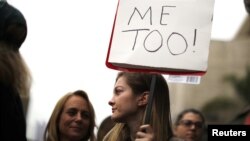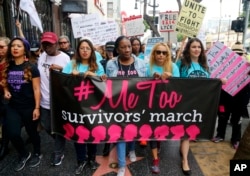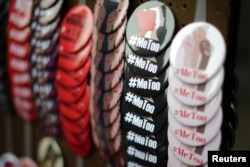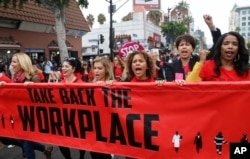Student Union
- By Katie Nicora
Sex Assault Not Unusual on Campus, Says #MeToo

She’d never been in his apartment at night, or even dusk, as it was now. Low purple light spilled into the living room, its walls lined and stacked with books. Light from the TV flashed red, blue and white, the nightly news.
She was 19 and the man beside her -- an intern supervisor -- was far too old to be putting an arm around her shoulders. Or sliding closer on the couch, as he was doing now, cupping her face in his hands to plant a kiss.
The story surprised her friends, but not deeply. Same song, different verse, they said. All her friends had experienced that particular blend of discomfort and fear brought on by an older man overstepping his authority.
In the days following, she poked around, searching out other female students who’d worked with him. One by one, they told her the same thing: No, they’d never gotten weird vibes. No, they’d never been invited to work at his apartment. And no, he’d definitely never touched them.
Knowing it would be another case of “he said/she said,” and that she had no evidence to show the school, she let it go. Statistics show that is not an unusual response.
But these past few weeks have seen a wash of public support for victims of sexual harassment and assault after powerful Hollywood producer Harvey Weinstein was outed for longtime predation.
Survivors are speaking up louder than ever, and campus activists are using that momentum to end the dynamic that powerful men -- like professors -- have over students who are eager to please intellectually and for good grades.
Women 18-24 are more likely to experience sexual violence than any other female demographic in the U.S., according to Rape, Abuse and Incest National Network (RAINN). College students within that age group are three times more likely than the average American woman to be assaulted. Young women within that age group not attending university are four times more likely.
According to a 2014 report from the U.S. Department of Justice, about 80 percent of victims knew their offender. No matter where they occur, these incidences are likely to go unreported, off or on campus. Nearly half of all targets say they thought their offender was under the influence of drugs or alcohol at the time of assault.
And, 20 percent of both groups cited fear of reprisal as the reason for not reporting.
“It’s absolutely heartbreaking,” said Clarke Rose, a student at the American University of Paris. “More importantly, it’s [expletive] necessary” to bring the issue to light.
Awareness campaign
In the days following allegations against Weinstein, millions took to Twitter, Instagram, Facebook, and other social media to share the hashtag #MeToo. The posts were part of an awareness campaign, aimed at exposing the pervasiveness of sexual harassment and assault, and rape culture in the United States.
Rose took part in France’s parallel – and somewhat more aggressive – campaign, #BalanceTonPorc, or “rat out your pig.”
“A lot of people have responded to #MeToo by asking why survivors are always the ones who have to come forward and bear our traumas in order for people to see us as human,” said Sofie Karasek, 22, to MTV. Karasek organized a candlelight vigil for the survivor advocacy group, End Rape on Campus, in Washington.
“It’s also a crucial time to point out that people accused of sexual assault don't just leave college and then disappear into the ether,” she said. “They can become powerful people who run companies, like Harvey Weinstein.”
In the weeks since, more allegations have spilled out, many against notable and powerful men. Female legislators and state employees have spoken out about their male colleagues in California, Massachusetts, and other states, citing harassment and inappropriate behavior.
In the last week, a criminal investigation was opened into allegations of sexual misconduct against three psychology professors at Dartmouth College in Hanover, New Hampshire. At Berklee College of Music in Boston, the administration caught flak this week for allowing a professor to quietly leave the school after a student accused him of sex abuse.
“Rather than being able to fully focus on coursework and learning, these students are burdened with the constant fear of violence and harassment on campus,” said Shivani Desai, a national campus organizer for the Feminist Majority Foundation (FMF).
“The #MeToo movement highlighted a reality of violence that women, queer, and trans folk already painfully and intimately knew – because we live it day in and day out,” Desai said.
“The power and reach of millions of voices provided a national platform, one that emphasized the dangerous culture that affords perpetrators and bigots positions of power and allows them to make harmful decisions.”
Student activists are “meeting with their administrators” to push back on issues like Title IX guidelines, which prohibit gender discrimination -- such as sexual harassment -- at colleges and universities that receive federal funding. Those guidelines were recently rolled back by Education Secretary Betsy DeVos.
A recent poll out from ABC News and the Washington Post shows 54 percent of American women have experienced “unwanted and inappropriate sexual advances” in the workplace. Thirty percent of women said their male colleagues were the perpetrators, with 25 percent saying these were colleagues who held sway over their careers.
Like their college-age counterparts, 95 percent of American women reported the offending male colleagues went totally unpunished. Since the last similar poll conducted in 2011, a majority of those polled said they consider sexual harassment a serious problem.
“Students have been organizing against sexual violence for countless years, and they will continue to fight for themselves and their communities,” Desai said of on-campus activists.
“What is most important, is that at this moment in history, we, all assault survivors, are sharing and listening and loving and finding out, we are not alone,” Rose said.
Do you know someone who has been harassed or assaulted by an older, more powerful person? Please share your thoughts in the Comments here, and visit us on Facebook, Twitter, Instagram and LinkedIn. Thanks!
See all News Updates of the Day
- By VOA News
Competition grows for international students eyeing Yale

It’s tough to gain admission to Yale University, and it’s getting even tougher for international students as standout students from around the world set their sights on Yale.
The Yale Dale News, the campus newspaper, takes a look at the situation here.
- By VOA News
Student from Ethiopia says Whitman College culture made it easy to settle in

Ruth Chane, a computer science major from Ethiopia, writes about her experiences settling into student life at Whitman College in the U.S. state of Washington.
"The community at Whitman College made sure I felt welcomed even before I stepped foot on campus," she says.
- By VOA News
Claremont Colleges student gets a shock when she heads home to Shanghai

In The Student Life, the student newspaper for the Claremont Colleges, a consortium of five liberal art colleges and two graduate schools in Claremont, California, student Rochelle Lu writes about readjusting to her Shanghai home after spending a semester in the United States.
- By VOA News
Cedarville University aims to ease transition for international students

Cedarville University in the U.S. state of Ohio says it’s got more than 140 international students representing 44 countries.
Here, the school interviews Jonathan Sutton, director of international student services. He talks about his job and the opportunities for international students on campus.
- By VOA News
Morehouse College offers prospective students tips on applying and thriving

Morehouse College, a private, historically Black liberal arts college in the U.S. state of Georgia, offers a guide for international students interested in attending the school.
Among the tips to apply and thrive at Morehouse:
- Take advantage of the school’s orientation program
- Turn to the school’s Center for Academic Success for tutoring, support and more
- Immerse yourself in campus life via clubs and societies


